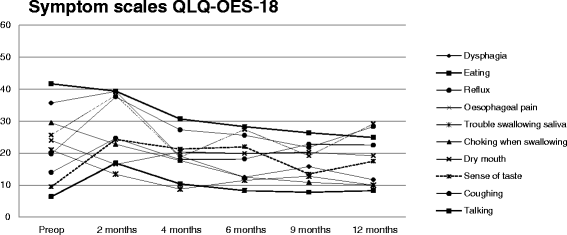Quality of life measurements as an indicator for timing of support after oesophagectomy for cancer: a prospective study
- PMID: 25890232
- PMCID: PMC4409990
- DOI: 10.1186/s12913-015-0747-x
Quality of life measurements as an indicator for timing of support after oesophagectomy for cancer: a prospective study
Abstract
Background: Oesophagectomy is a major procedure with known side effects and reduced postoperative quality of life (QOL). It has been shown that support of patients in their new life situation is often lacking. Knowledge about how QOL changes over time is fundamental for addressing patient needs and for determining the optimal timing of supportive care. The aim of this study was to identify QOL changes over time as well as factors that may impact patient QOL during the first year after oesophagectomy for cancer.
Methods: Patients operated on for adenocarcinoma or squamous cell cancer of the oesophagus were included in this study. Seventy-nine patients completed the European Organisation for Research and Treatment of Cancer QOL questionnaires (QLQ-C30 and QLQ-OES18) before and 2, 4, 6, 9, and 12 months after surgery. A general linear model with repeated measurement analysis of variance was used for statistical testing.
Results: There was a significant QOL nadir at 2 months compared to 12 months after surgery (QLQ-C30 function scales p < 0.001, symptom scales p < 0.001, QLQ-OES18 scales p < 0.001). Treatment with proton-pump inhibitors was associated with enhanced QOL according to QLQ-C30 symptom scales (p = 0.003) and OES-18 scales (p = 0.015), but age, gender and American Society of Anaesthesiologists classification did not significantly impact QOL.
Conclusions: Patient QOL is severely hampered the first year after oesophagectomy for cancer, with a nadir at 2 months after surgery. Treatment with proton-pump inhibitors improved patient responses to symptom scales. Evidence of severely affected QOL after surgery indicates that these patients need support at an early stage after surgery. These results can be used by healthcare professionals to develop a postoperative supportive-care programme that is timed and better optimised to meet patient needs.
Trial registration: EudraCT database 2009-009997-28.
Figures



References
Publication types
MeSH terms
Associated data
LinkOut - more resources
Full Text Sources
Other Literature Sources
Medical

